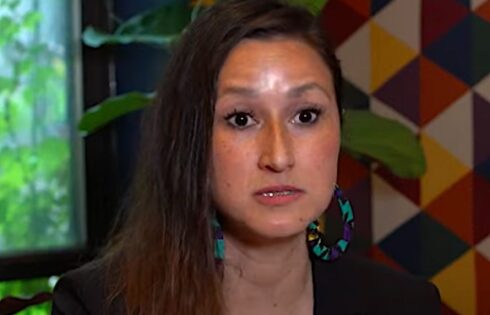
When Amherst College was sued by a student it expelled for rape – whose “blacked out” state during the encounter the school called “credible” – its response boiled down to: We followed our own rules, and we’re a private school.
Not really, and that’s not the point, the accused student (“John Doe,” a second-generation Asian American) responded in a brief Wednesday opposing Amherst’s “motion for judgment on the pleadings.”
Much of John Doe’s brief rehashes his original filing – his blacked-out state, the lead role “Sandra Jones” played in performing oral sex on him (by her own admission), and her “exculpatory” text messages that suggest she was the aggressor and tried to seduce another guy right after fellating Doe – but emphasizes Amherst’s “startling indifference” to tracking down all evidence, regardless of whom it benefited.
(For a one-minute rundown of Doe’s new filing, see this tweet summary by KC Johnson, Brooklyn College professor and co-author of a book on the Duke lacrosse rape case.)
Amherst violated the judicial principle of “basic fairness” to Doe, the brief says – not letting him obtain Jones’ texts that she had lied about not existing or investigate at all on his own, giving him an ineffective and misleading “advocate” rather than his own attorney, and ignoring its own rules when Jones admitted performing a sex act on an incapacitated person (Doe).
New filing by Amherst plaintiff shows effects of college's failure to consider exculpatory evidence: pic.twitter.com/qN8YZ0L5eb
— KC Johnson (@kcjohnson9) November 18, 2015
The school’s sole reason for not letting Doe pursue Jones’ concealed evidence is that it was discovered after his seven-day appeal window:
What is most remarkable about Amherst’s motion is that at no point in the filing does it make any effort to explain how a fact-finding process that overlooks evidence so thoroughly devastating of a complainant’s account can be considered fair by any measure. This is the overriding issue in the case, which Amherst wholly fails to confront. Instead, its response is limited to a hypertechnical analysis of the precise black letter components of its written procedure, in an effort to show that each one was observed and that others were never granted in the first place. As set out below, even this analysis is flawed. At any rate, Amherst completely misses the point, which is that the procedures actually employed — some in accordance with the [Student] Handbook and some not — allowed no opportunity for the exculpatory evidence to emerge.
The filing goes on to marvel at how Doe could be held responsible for sexual misconduct when he was not aware of what was happening – as Jones continued fellating him despite Doe having no “conscious or voluntary agency” in the act – and how Amherst’s hired investigator failed to interview the two parties that talked to Jones right after the act.
Amherst’s reply was that the investigator has considerable discretion under its handbook rules, but that ignores prescriptive parts of the handbook, Doe says:
No reasonable interpretation of these complimentary [sic] sections of the Handbook would suggest that the investigator had the discretion to exclude exculpatory information from her inquiry, or to fail to explore the existence of contemporaneous witnesses or communications which might bear upon the complainant’s account. This is particularly so where, as here, the investigator must have understood that the entire proceeding, and Doe’s fate, depended on Jones’s credibility … Even where a professional is contractually charged with discretion in completing a task, this does not mean the professional is free to abrogate the most basic, minimal standards. Doctors and lawyers, among others, are sued all the time for failing to comply with the elementary standard of care for doing or failing to do things that are not specifically spelled out in the engagement.
Filing notes abysmal failure of Amherst's hired investigator to even try to find key evidence: pic.twitter.com/3kFZ9O94YS
— KC Johnson (@kcjohnson9) November 18, 2015
RELATED: She initiated sex with me when I couldn’t consent, expelled student claims
Doe points out that his adviser was “simply wrong” on what evidence he could introduce, depriving him of a contractually obligated “trained adviser,” and alleges Amherst is liable for “selective enforcement” against him under Title IX:
Thus, if Jones were telling the entire truth, she was at least equally culpable to Doe. If anything, she was more culpable since he was incapacitated and she was not. Yet Amherst allowed her to go on to graduation, but expelled Doe, for the identical conduct. This is as clear a prima facie case for selective enforcement as there could be.
In response to Amherst’s point that Doe never filed a complaint against Jones, Doe reads back Amherst’s own handbook to the school, as well as the Office for Civil Rights’ infamous 2011 “Dear Colleague” letter:
Amherst’s policy explicitly authorized it to prosecute sexual misconduct without the assent of the victim. … Indeed, Title IX requires it at least to investigate and consider prosecution of sexual misconduct of which it is aware. See Dear Colleague Letter at p. 4 (“Regardless of whether a harassed student . . . files a complaint under the school’s grievance procedures or otherwise requests action on the student’s behalf, a school that knows, or reasonably should know, about possible harassment must promptly investigate to determine what occurred and then take appropriate steps to resolve the situation” (emphasis added)). … Amherst was indisputably aware that Doe had been assaulted by Jones, yet it simply turned a blind eye.
Advisor Amherst assigned to accused student told him (falsely) he couldn't pursue key exculpatory witness: pic.twitter.com/V1KqEgnIKl
— KC Johnson (@kcjohnson9) November 18, 2015
Clearly Doe has alleged violations by Amherst sufficient to keep the case headed for trial, the brief says:
He has shown more than a prima facie case of disparate treatment by sex. Doe has shown a lack of concern for his consent, an attitude undoubtedly the product of the old canard that men always want to have sex with women. And he has shown that Amherst was under extreme pressure, when considering his case, to show that it could and would take disciplinary action against a male.
My prediction is that the federal judge in Massachusetts hearing this suit will let the case proceed and Amherst will pay a hefty settlement to Doe, who otherwise may decide to plead his case in the court of public opinion as a male victim of sexual assault.
If Bruce Jenner can become Caitlyn to public acclaim, surely a sympathetic Asian-American male, “the son … of immigrants,” can become a victim of a cold and calculating female sexual opportunist who took advantage of outdated stereotypes about the sexes.
Filing: under Dear Colleague Letter, @AmherstCollege had an independent obligation to investigate accuser: pic.twitter.com/8dP0mcvkTn
— KC Johnson (@kcjohnson9) November 18, 2015
Like The College Fix on Facebook / Follow us on Twitter
IMAGE: chattanongzen/Shutterstock







Please join the conversation about our stories on Facebook, Twitter, Instagram, Reddit, MeWe, Rumble, Gab, Minds and Gettr.